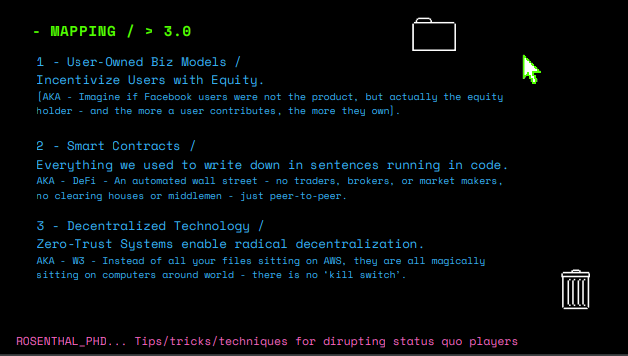
Could Bitcoin Reach A $1 Million Milestone Sooner Than Later? Here's A Possible Path To Achieving It

In the past half-year, Bitcoin (BTC) has seen remarkable expansion, with its value rising by 50% and breaking the $100,000 barrier for the first time. The cryptocurrency community is bullish on the recent election outcome, expecting President Donald Trump's leadership to fuel further growth and propel Bitcoin to new levels in the years to come. The cryptocurrency space is abuzz with interest, and a recent announcement from the Trump administration, which is seen as more crypto-friendly, has sparked anticipation that it could be a catalyst for even more incredible price appreciation for Bitcoin.
Following Gary Gensler's resignation as the Chairman of the Securities and Exchange Commission (SEC), known for his negative stance on cryptocurrency, Mark Uyeda has taken on the role of acting chairman. Uyeda is recognized for supporting cryptocurrency and blockchain advancements, marking a notable shift from Gensler's strict regulatory strategies. Uyeda's more favorable stance towards cryptocurrency could potentially lead to less stringent regulations, positively impacting Bitcoin's value. Uyeda will serve as acting chairman until the Senate confirms Paul Atkins, the nominated SEC chairman.
Government Establishes New Task Force to Create Cryptocurrency Guidelines
Mark Uyeda has recently introduced a new team to create a well-defined set of rules for crypto assets. This move has the potential to enhance the trustworthiness and legality of cryptocurrencies. The task force's role is to establish clear guidelines for the issuance and trading of cryptocurrencies, which could provide more certainty for investors and potentially increase the value of Bitcoin.
Introducing a registration system for new coins could also lower the risks associated with investing in them. Furthermore, it addresses the question of whether cryptocurrencies should be classified as securities by the SEC and outlines the guidelines that issuers of crypto assets must follow.
If the task force were to establish rules that support cryptocurrency, which numerous investors anticipate due to Trump's approving remarks during his campaign and his strong ties with pro-crypto advocate Elon Musk, it could significantly boost the value of Bitcoin in the current year.
What Would It Take For Bitcoin To Reach $1 Million?
Cathie Wood is an American investor and the founder, CEO, and chief investment officer (CIO) of Ark Invest, an investment management firm. She is recognized for her emphasis on thematic investing strategies that capitalize on megatrends expected to influence the global economy in the coming decades. She has strong faith in the promise of disruptive innovation.
Approximately two years ago, she garnered significant attention by boldly predicting that Bitcoin's value would ascend to $1 million by 2030. This forecast was made before Bitcoin surpassed the $100,000 threshold and coincided with the introduction of spot Bitcoin exchange-traded funds (ETFs) in January 2024. At that particular juncture, Bitcoin was recovering from the severe cryptocurrency downturn in 2022, which raised questions regarding its future potential.
In a recent conversation with Bloomberg, Cathie Wood updated her forecast and now posits that Bitcoin has the potential to attain a value of $1 million before 2030. The catalyst for this revised prediction is the greenlighting of Bitcoin exchange-traded funds. Nevertheless, despite the significant impact of these ETFs, Wood contends that this development represents merely the initial step in Bitcoin's progression within traditional finance.
She pointed out that all significant price movements so far have occurred before any wirehouse entered the Bitcoin market. These prominent institutions, which include well-known names like Morgan Stanley, Wells Fargo, and Bank of America, wield considerable influence in areas such as investment guidance, wealth management, and brokerage. If these industry giants were to embrace Bitcoin, it could trigger a chain reaction that propels the cryptocurrency to unprecedented levels.
Historically, wirehouses have maintained strict policies focused on concerns of suitability, eligibility, and the risks associated with offering Bitcoin and related products to clients. While these policies may have evolved, the core reluctance to fully embrace cryptocurrencies remains due to regulatory, risk, and compliance issues. However, this may all change with the pro-crypto Trump administration.
According to Wood, institutions recognized for their substantial resources and financial assets, greater involvement from these institutions could play a pivotal role in accelerating Bitcoin's rise to the highly anticipated $1 million milestone. However, Wood emphasizes that we haven’t even begun until wirehouses become more actively involved.
She believes major political and regulatory shifts could drive cryptocurrency to unprecedented levels. Following Donald Trump's election, Wood expects a rise in private company acquisitions, previously impeded by "regulatory red tape. " She argues this will create significant opportunities for investors and venture capitalists. Additionally, she indicated that, under ideal circumstances, it could rise to $1.5 million.
Wood posits that Bitcoin represents a groundbreaking transformation in the financial landscape. The emergence of a currency like Bitcoin is unprecedented and marks a historic milestone. In her interview, Wood highlighted that Bitcoin is uniquely distinguished as “the first global, private, digital, decentralized, rules-based monetary system in history."
These traits position Bitcoin to spearhead a monetary revolution that may transform the financial autonomy of individuals, organizations, and potentially entire nations. Considering all factors, Wood anticipates Bitcoin's market cap could skyrocket to over $20 trillion, catapulting the price of a single Bitcoin to a staggering $1 million or more.
What Other Influences Are Driving Wood's Positive Outlook On Bitcoin?
Cathie Wood correlates Bitcoin’s recent and prospective growth with market dynamics and its intrinsic scarcity. She highlights a sharp distinction between Bitcoin and gold, pointing out that while rising gold prices generally stimulate increased production, Bitcoin’s fixed supply guarantees its scarcity will only grow over time. She remarked that Bitcoin is becoming increasingly scarce compared to gold, strengthening her conviction in Bitcoin’s unique value proposition.
One of the factors contributing to the significant appreciation of Bitcoin's value is its intrinsic scarcity. The Bitcoin protocol caps its total supply at 21 million coins, with 19.8 million already mined. The supply of Bitcoin is meticulously regulated by its algorithm, making it impossible to increase production in the manner that can be done with gold.
The scarcity of Bitcoin is paramount, given the escalating interest in this cryptocurrency, evidenced by the rising number of individuals keen to acquire it. Consequently, the augmenting demand is anticipated to elevate the value of Bitcoin, attributable to its finite supply.
The Building Blocks To Bring BTC To $1 Million And Beyond
Wood employed a model based on building blocks to evaluate Bitcoin's potential worth, which informed her initial valuation estimate of $1 million. According to Ark Invest, several key factors contribute to the overall demand for Bitcoin, each playing a distinct role in shaping its market value.
A key factor driving the market is the growing appetite of institutional investors, who are increasingly diversifying their portfolios by allocating a more significant share to Bitcoin. The recent introduction of spot Bitcoin ETFs has given these investors a powerful tool to fine-tune their Bitcoin exposure. Notably, 2024 marked a significant turning point as the market transitioned from being driven by individual speculation to substantial investment from institutional players.
Another building block and a key driver of Bitcoin's growth is its increasing appeal as a long-term store of value. Historically, the idea of replacing traditional gold with "digital gold" in the form of Bitcoin had not gained significant traction. However, a growing number of investors are now turning to Bitcoin as a safeguard against rising inflation.
Another fundamental component is what Wood describes as a "nation-state treasury," which represents the demand from central banks and sovereign governments. Globally, nation-states are considering the potential of holding Bitcoin as a reserve asset.
A prominent illustration is President Donald Trump's commitment to establish a strategic Bitcoin reserve for the United States during his campaign. According to the existing framework of the proposal, the federal government aims to acquire 1 million units of the cryptocurrency over five years, with a suggested retention duration extending to twenty years.
Moreover, several states, including Texas, Florida, and Pennsylvania, plan to set up their own strategic Bitcoin reserves, indicating that the trend of government ownership of Bitcoin is gaining traction. This move could prompt other nations to explore integrating Bitcoin into their national reserves, further legitimizing and stabilizing the cryptocurrency market.
Check out this intriguing video explaining why Bitcoin is not a bubble.
The Massive Scale And Adoption Of Bitcoin To $1 Million
A Bitcoin valuation of $1 million suggests a significant increase in investment in Bitcoin, fueled by its wide adoption and recognition as a valuable asset on a global scale. The potential outcomes are extensive:
Economic Impact: The economic significance of Bitcoin reaching a market capitalization of $20 trillion would catapult Bitcoin to a prominent position as a major asset class, potentially influencing global monetary policies and financial systems. Such a market cap would surpass the GDP of many countries, positioning Bitcoin's value close to that of the United States, which currently has a GDP of around $23 trillion.
Change in Investment Focus: Potential strategies could divert funds from conventional investments such as equities, fixed-income securities, and property to Bitcoin. The decision by prominent companies like MicroStrategy, Tesla, and Square to incorporate Bitcoin into their financial holdings suggests a rising recognition of its validity as a distinct investment category. As a result, the increasing perception of Bitcoin as a reliable store of value could significantly impact its market value.
Global Influence: Bitcoin possesses the potential to become an integral component of the global financial system, impacting various sectors, including banking, monetary transfers, and international commerce. The network effect plays a crucial role in the extensive adoption of Bitcoin. As more individuals participate in and invest in Bitcoin, its utility and value are augmented. This positive feedback loop can increase acceptance, establishing a cycle that enhances Bitcoin's value.
Final Thoughts
For Bitcoin to achieve a market cap of $20 trillion, various factors, such as market trends, acceptance levels, technological advancements, and broader economic conditions, must converge harmoniously. Like the value of any asset, Bitcoin's value is influenced by the prevailing market sentiment. Changing how Bitcoin is perceived—from a speculative asset to an integral component of financial frameworks—could significantly drive its value to such substantial levels.
Economic instability or inflation in conventional currencies has already demonstrated an ability to attract more investors to Bitcoin, which is regarded as a "store of value." Should traditional financial systems encounter substantial crises, Bitcoin will likely be perceived as an increasingly safer alternative, enhancing its perceived value.
While a $1 million valuation for Bitcoin within the next five years may seem unlikely to some, it's unwise to rule out any possibility in the fast-paced and evolving realm of cryptocurrencies. The increasing interest in Bitcoin from a broad range of buyers, including individual investors, financial institutions, corporations, and governments, is a trend that cannot be overlooked. With a scarcity in supply and high demand, prices are expected to rise significantly in the future.
The culmination of successful introductions of Bitcoin ETFs, favorable macroeconomic policies, and growing institutional involvement marks a significant turning point for Bitcoin. These factors are expected to propel Bitcoin's transition from a speculative investment to a widely accepted financial tool, appealing to a broader range of investors and cementing its position in the global economic landscape.
This article is provided for informational purposes only and should not be relied upon as legal, business, investment, or tax advice. Furthermore, however plausible, the contents of this article may include speculative opinions. Of course, there is nothing wrong with speculation as long as its premises are made clear. Speculation is the customary way to begin the exploration of uncharted territory as it stimulates a search for evidence that will support or refute it.

Tim Moseley

.png)




.png)

.png)


.png)
.png)
.png)








.png)
.png)
.png)











